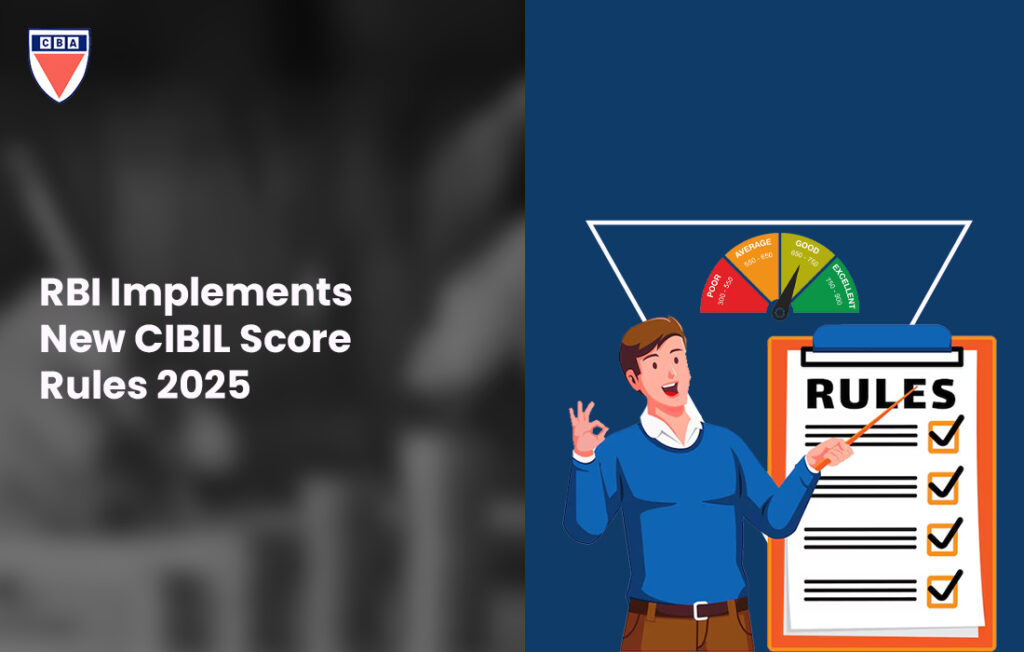The Reserve Bank of India (RBI) is rolling out the CIBIL score system under new rules in 2025, which will radically change the calculation of credit scores and impact borrowers. The new rules were created to create a more transparent, inclusive, and efficient credit system. Therefore, these changes will impact individuals, lenders, and whole financial institutions in many ways. In this article, we will examine the main changes and determine how these will affect your credit profile.
Understanding the CIBIL Score
To begin with, let’s discuss what the role of a CIBIL score is within the credit ecosystem. We need to first understand what a CIBIL score is. CIBIL (Credit Information Bureau (India) Limited), one of India’s biggest credit bureaus, monitors a person’s credit history to assist lenders in determining the likelihood of a borrower meeting their loan obligations. A CIBIL score generally ranges from 300 to 900; the higher the score, the better the credit history and, therefore, the higher the likelihood of the loan being approved.
Having a good CIBIL score (generally 750 and above) should increase an applicant’s chances of obtaining loans or access to credit and good interest rates/cheaper loans. A low score will likely restrict access to credit, particularly from lenders who may deem the borrower a risk and therefore charge them a higher interest rate.
Key Changes in RBI’s New CIBIL Score Rules 2025
The recent rules from the RBI introduce many fundamental changes that change how credit scores are viewed in India. Some of the highlights of the changes include
1. Use of Alternative Data Sources
One of the largest changes introduced was the ability for CIBIL scores to start using alternative data sources. Historically, CIBIL scores were determined solely by the payments of traditional credit types, i.e., loan payments, credit card usage, and outstanding debts. With the new rules, the RBI now permits credit bureaus to access alternative data sources (i.e., utility bills, rent payments, and mobile phone bills), which can be assessed as part of their overall credit score.
The inclusion of using alternative data sources will drastically improve individuals without or with extremely limited formal credit history, as regular payments of utility bills, for example, or even rent, will count towards their credit score. The RBI’s rules indicate a decision to encourage a more inclusive form of credit scoring, which will ultimately help people who qualify for further credit but were previously unprepared for formal credit evaluations.
2. Relaxation of Timeframe for Reporting Negative Information
The RBI has changed the regulations concerning negative information (defaults or delayed payments). Under the previous regulations, negative information could be reported on a person’s credit report for a maximum period of 7 years. However, the new regulations reduce the reporting period for negative information to 5 years. This is a positive move for individuals potentially impacted, who may have had financial difficulties that have since improved their credit behaviour. Under the new regulations, individuals will be able to redeem themselves more quickly and get another crack of the whip on credit.
3. Enhanced Transparency surrounding Credit Reporting
On top of the improvements on the regulations discussed above, the biggest enhancement will be transparency for consumers, as they will have improved access to their credit reports and the ability to track changes in their credit score. Credit bureaus will have to provide consumers with increased detail around the various effects on credit score, meaning consumers can understand and manage their credit report better.
Also, lenders will have to provide clarification when denying loans or extending credit at higher interest rates, rather than just the wording “Too many delinquencies.” Consumers with more clarity now have a road map for what needs to be improved in their credit history.
4. Credit Score Updates Based on Regular Transactions
The new regulations will also focus on informing credit scores in real time based on the regular financial transactions people make. Before, credit scores were calculated on a monthly or quarterly basis, with their impact on a borrower’s credit score being delayed. Today, CIBIL scores will be updated in real time, and this means when individuals are paying off their debt or taking on a new loan, there will be no delay in their ability to witness the action it takes to improve their score.
This real-time update ensures that borrowers who have been diligent about maintaining their finances will see their score improve quickly. On the other side of the coin, people who may have been late on a payment will be able to see their score drop without delay, using this information to better manage their finances.
5. Enhanced Focus on Credit Utilization Ratio
As a result of the changes in regulations by the Reserve Bank of India, a key issue will be the credit utilization ratio (how much credit is utilized against the credit limit available). The credit utilization ratio is becoming even more significant in the information providers’ reporting, and consequently, a significant factor in CIBIL scores. The credit utilization ratio increases when people utilize credit. A higher credit utilization ratio, especially over 30%, negatively impacts their CIBIL scores. Consequently, it invites the attention of random number generators by suggesting that the user is becoming overly dependent on credit usage. On the contrary, a consistently low credit utilization ratio suggests that one is handling and using credit facilities responsibly.
The Reserve Bank of India’s new regulations on credit utilization will now require the information providers to emphasize this fact even more heavily, and as such, encourage users to keep their credit utilization ratio below the recommended number. People with consistently low usage in comparison with their credit limit will gain and benefit from their efficiency, and their scores will undoubtedly improve, which will lead to getting loans at a preferred rate of interest.
6. Impact on Credit Access for Small Businesses
Similar to small- and medium-sized businesses (SMBs), the changes from the RBI will create significant implications for credit access. Credit bureaus now have the option to include certain business-related financial dealings, like vendor payments and revenue growth, into a business owner’s personal credit profile. This will create an opportunity for entrepreneurs to more easily establish creditworthiness based on their business activities and history sector.
Additionally, lenders will be more likely to use the new rules to develop unique financing options for small businesses. This could mean groundbreaking financing opportunities for entrepreneurs who have had difficulty securing business loans via traditional financing and credit history.
Effects of the Changes on Your Credit
The new CIBIL score guidelines issued by the RBI will have different effects on borrowers, lenders and the financial ecosystem more widely. Here’s how the changes may affect you:
For Consumers:
- Better Access to Quality Credit: Existing alternative data makes it possible for those with little credit history to build or improve their credit score. Earlier, the considerations for credit were primarily focused on the traditional data of your credit repayment history. Now, the usual payments for your utilities, rent, and other non-credit behaviors can be tracked and counted. This change means a lot more people can now gain access to a range of credit products, as credit accessibility has been changed for a greater number of consumers.
- Faster Recovery from Past Defaults: If you have had difficulties with finances previously, you would benefit from the change in the reporting time of negative information, now reduced from 7 years to 5 years; you will also have a quicker turnaround to rebuild your credit with your improved behavior. Essentially, your story improvement would reflect in considerably shorter time, allowing you to benefit from quality financial products sooner.
- Real Time Access to Information about Your Credit Score: The professional reporting agencies will now be updating your credit score in real time; the value of this change is significant for consumers in that you can respond more readily to improving or changing financial needs; if you are looking to apply for a loan or use your credit card motivation towards timely payments, you can track your overall credit position more closely.
For Lenders and Financial Institutions:
- Increased Inclusivity in Lending: The new regulations enable lenders to evaluate a variety of data points to determine a borrower’s ability to pay back a loan, including alternative sources of information. Because of this, lenders will more easily be able to fund an individual with little or no past access to credit.
- Better Risk Evaluation: With access to real-time updates and detailed credit reports, lenders are able to make sounder decisions and better assess the risk of defaults. Lenders have more clarity into their borrowers’ financial habits and would be able to structure lending products accordingly.
For Small Businesses:
- Expanded Access to Business Loans: Small business owners will be able to qualify for loans and credit lines more easily through the inclusion of business-related transactions in personal credit scores. Financial institutions will be able to have better assessments of personal and business performance and build an accurate creditworthiness picture of small business owners.
Conclusion
The changes set in motion by the RBI for CIBIL credit scores in 2025 will create a positive and inclusive credit environment for everyone in India. The advent of alternative data, real-time reporting of scores, and responsible use of credit will provide consumers, lenders, and businesses with unique options. In terms of individual and consumer options, the new CIBIL loans policy gives consumers a golden opportunity to build or improve an individual’s credit profile, as well as access some of the best offerings of financial products in India. For lenders, it gives them insight into strengthening their client onboarding and decision making, and for consumers and businesses, it can provide to a healthier and more robust credit environment.
Even while the credit landscape is rapidly changing, please try to stay up to date with your credit score, make sure you are paying your bills on time, and remember to periodically review your credit report and credit profile to take advantage of these exciting new regulations!






